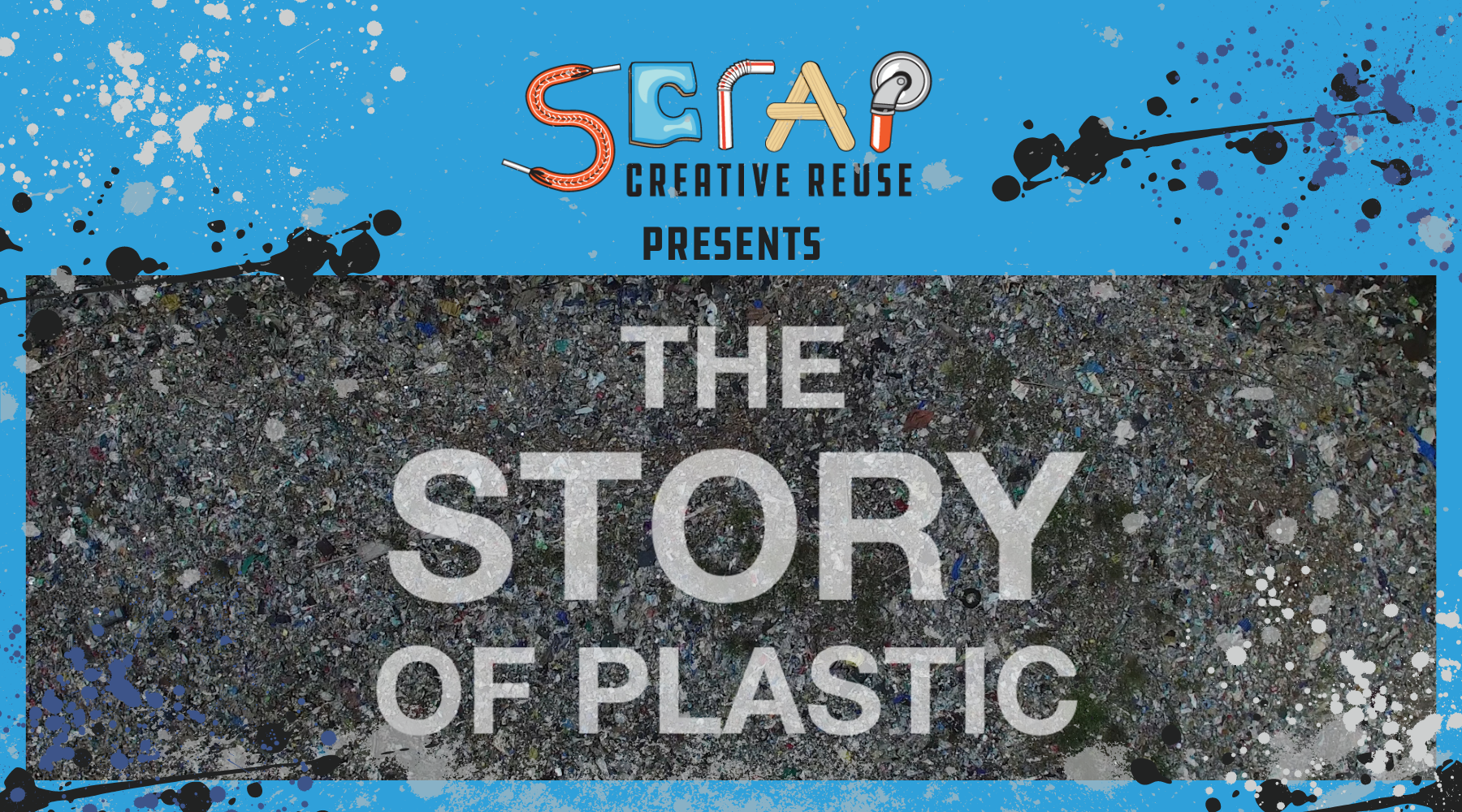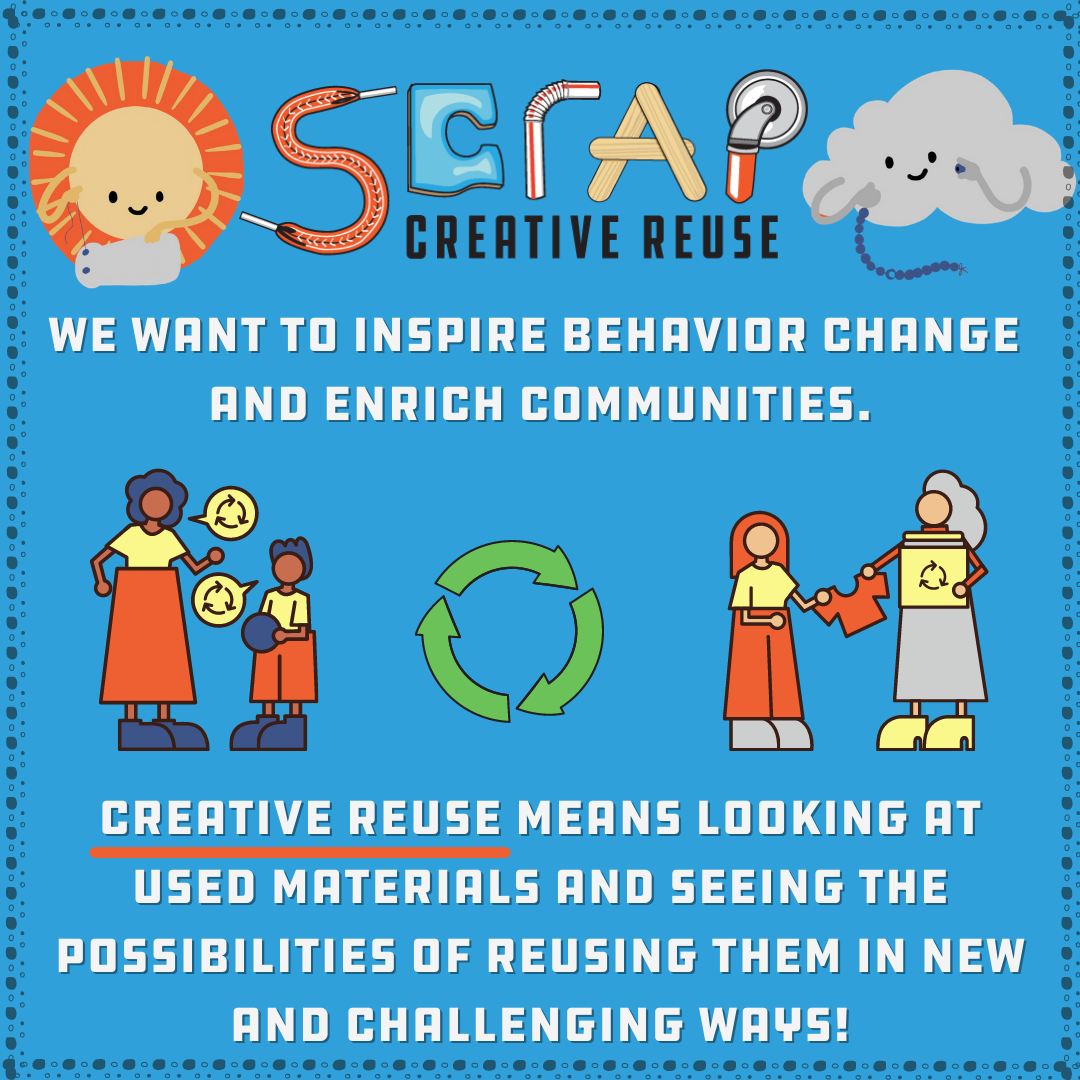
At SCRAP we emphasize reuse, and more specifically creative reuse, as an important factor in practicing sustainable behavior. But we also want to examine the interconnected environmental issues related to waste, recycling, and the lifespan of the materials that come through our creative reuse centers.
Plastics, and especially single-use plastics, are causing a huge environmental and pollution crisis globally. It is now believed that there are 5.25 trillion pieces of plastic debris in the ocean. Of that mass, 269,000 tons float on the surface, while some four billion plastic microfibers per square kilometer litter the deep sea. And plastic pollution occurs on land, too, where landfills may be ineffective, or nonexistent. Recycling is also not a long-term solution. It’s estimated that in 2015, around 55 percent of global plastic waste was discarded, 25 percent was incinerated, and only 20 percent was recycled. Of the plastic waste produced between 1950 and 2015, only 9 percent was recycled.
Disposal and waste management issues aren’t the only considerations for plastic pollution. Virtually all (over 99%) plastics are produced from chemicals sourced from fossil fuels. The plastics value chain is complex and spans the globe – from oil and gas extraction to plastic production and distribution to consumption and finally disposal, recycling, incineration, and export – the impacts of plastic pollution are present in every community.
In order to help inspire and educate our communities, SCRAP Creative Reuse is presenting virtual screenings of “The Story of Plastic”, followed by a post-screening discussion with some of our creative reuse team!
The film reveals the links between the plastics crisis and other pressing issues: climate, human health, environmental justice, and the global waste trade, among others. Join us in watching the film virtually, from your home, March 6 – 12, 2021. And join us for the post screening discussion, March 13, 2021.
SCRAP Creative Reuse wants to inspire behavior change and enrich communities to become more environmentally conscious and creatively sustainable. We emphasize reuse because it is environmentally friendly and reduces pollution, it is affordable and accessible, and it teaches resourcefulness while extending the lifespan of reused objects.
Reuse is defined as using an object or a material more than once. Creative reuse means looking at used materials and supplies in an innovative and resourceful manner and seeing the possibilities of reusing them in new and challenging ways – often without regard for the original purpose. Problem solving skills and resourcefulness are key components in the creative reuse process. Seeing what is and imagining what may become, using what you have to create what you need/want.

Additional waste and pollution ideas to have in our reuse tool-kit include Craftivism and Zero Waste. “Craftivism” was coined by Betsy Greer in 2003. Greer’s definition reads: ‘a way of looking at life where voicing opinions through creativity makes your voice stronger, your compassion deeper.' The connections of Craft + Activism are woven through SCRAP Creative Reuse, in our mission, vision, and goals, and our ability to be a resource for our communities.
What is zero waste?
Zero Waste is an innovative approach to the use of resources. It ensures resource efficiency (e.g, resources are not wasted), resource recovery (e.g., resources are reused or otherwise recycled, not burned or buried), and protection of scarce natural resources (e.g., use of renewable resources).
Zero Waste guidelines:
Resources:
https://oceancrusaders.org/plastic-crusades/plastic-statistics/
https://ourworldindata.org/faq-on-plastics
Craftivism Video https://www.youtube.com/watch?v=nSbeL9B3xRc&feature=youtu.be
“The Story of Stuff” by Annie Leonard
“The Story of Plastic” https://www.storyofplastic.org/
.png?216x89)
SCRAP is a 501(c)(3) nonprofit organization, Federal Tax ID 93-1270807.
Donations are tax deductible as allowed by law.
©2021 SCRAP Creative Reuse All rights reserved. SCRAP™ is a trademark of SCRAP Creative Reuse | Website by Morweb.org
